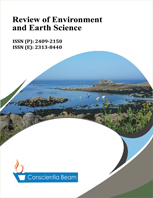Micro Level Geo-Resistivity Survey through V.E.S. Test for Groundwater Feasibility Study and Selection of Bore Well Sites in Pipili Block of Puri
DOI:
https://doi.org/10.18488/journal.80/2014.1.2/80.2.37.45Abstract
The geo-resistivity was conducted in an area near Jamukoli of Pipili block under Puri district of Odisha to study the groundwater feasibility and selection of site for installation of bore wells. The reason for choosing this area is due to the poor and backward inhabitants residing in the locality. Vertical Electrical Sounding Test most commonly known as Schlumberger Test was conducted at five locations to get a confirmation regarding groundwater occurrences and their feasibility to tap water from deep bore wells. It is surprising to note that during course of investigation there is a huge variation in groundwater occurrences within a span of a couple of meters. This is probably a fault zone which might have been extending in the SE to NW direction. Though the subsurface lithology shows a vertical dissemination of laterite and sandstone but aquifer has been recorded in the region where the lithology is either weathered or fractured. Groundwater exists at a depth of 70m – 90m and an expected 3000 l/hr. can be discharged comfortably in few locations.

